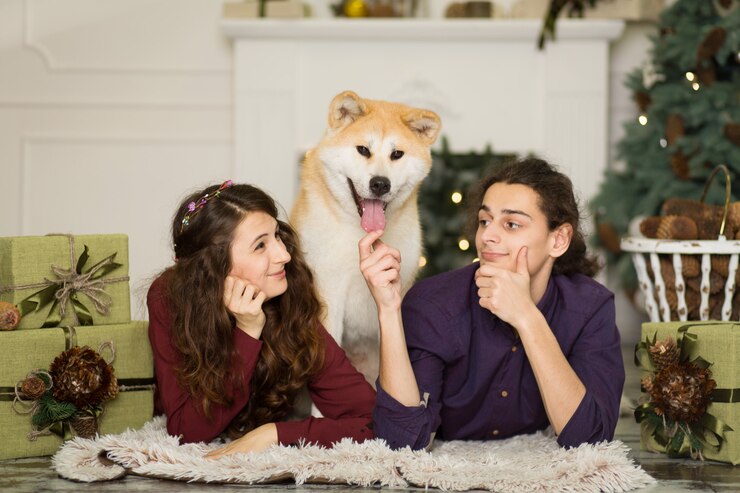If you’re a petslover, you know pets aren’t just animals—they’re family! From snuggling with a sleepy cat to walking a dog through the park, the bond we share with our pets is like no other. But loving your pet goes beyond affection; it’s also about making sure they’re healthy, happy, and thriving. Here are 10 ways to show your pet some love while keeping them in the best health possible.
1. Feed a Balanced Diet
Feeding your pet high-quality, nutritious food is the foundation of good health. Make sure you choose a food that meets their nutritional needs based on species, age, and lifestyle. Dogs and cats benefit from diets rich in protein, while small animals like rabbits and guinea pigs need plenty of fresh hay and vegetables. Consult your vet to find the best food for your pet’s needs and avoid giving too many treats, which can lead to weight gain and other health issues.
2. Exercise Regularly
Exercise isn’t just for high-energy pets like dogs; all pets need some form of physical activity. Exercise keeps your pet physically fit and helps prevent obesity, but it also reduces anxiety, prevents boredom, and can even improve behavior. Try daily walks, interactive toys for cats, or obstacle courses for small animals. You’ll see a happier, healthier pet!
3. Schedule Vet Checkups
A yearly visit to the vet is one of the best ways to ensure your pet’s health. Regular checkups can catch potential issues early, helping to prevent serious illnesses. Your vet can also help you stay up-to-date with vaccinations, parasite prevention, and dental care. Remember, a healthy pet is a happy pet!
4. Keep Their Teeth Clean
Dental care is essential for pets, yet it’s often overlooked. For dogs and cats, regular brushing or dental chews can prevent plaque buildup and keep their breath fresh. Small animals like rabbits and guinea pigs need plenty of chewable toys to keep their teeth worn down and prevent dental issues.
5. Create a Safe and Comfortable Home
Your home should be a safe, cozy retreat for your pet. For dogs and cats, provide comfortable beds, scratching posts, and designated play areas. Birds need spacious cages with perches and toys, while small mammals like hamsters and guinea pigs need safe enclosures with hiding spots, tunnels, and bedding. Make sure their living space is clean and enriched to keep them mentally stimulated and happy.
6. Mental Stimulation and Enrichment
Pets can get bored and anxious if they lack mental stimulation. Interactive toys, treat puzzles, and games can keep their minds active and prevent boredom. Dogs love fetch, cats enjoy chasing toys, and even small pets appreciate foraging toys. Mental engagement helps reduce behavioral problems, making for a happier, well-adjusted pet.
7. Prioritize Grooming
Regular grooming keeps your pet comfortable and helps maintain their health. Brush your pet’s coat to prevent mats and reduce shedding, trim their nails, and keep their ears and teeth clean. Birds and reptiles might need misting or specific grooming routines, so learn what’s best for your pet. Grooming sessions can also be a bonding time, especially for pets who enjoy being handled.
8. Socialization and Training
Well-socialized pets are more confident and better behaved. Dogs, especially, benefit from socialization with other dogs and people, which reduces anxiety and aggression. Training, whether it’s basic commands or more advanced tricks, builds trust and communication between you and your pet. For cats, positive reinforcement training can help with litter box use or discourage scratching on furniture.
9. Show Affection Daily
Your pet may not speak, but they thrive on your attention and love. Spend time with them each day, whether through play, petting, or simply sitting together. Pets understand love through physical touch, eye contact, and play. This daily bonding strengthens your connection and gives them a sense of security and happiness.
10. Provide Routine and Stability
Pets feel secure when they know what to expect. A regular routine for feeding, playtime, and bedtime can help reduce stress and anxiety, especially in dogs and cats. Try to keep to a schedule, even if it’s a flexible one, and avoid sudden changes that could unsettle your pet. Stability helps them feel safe, leading to a happier and healthier pet.
Conclusion
Our petslover give us so much love and joy, and it’s up to us to return that love with the care they deserve. By providing a balanced diet, regular exercise, veterinary care, and plenty of love and attention, you can ensure your pet enjoys a long, happy, and healthy life. A few small changes can make a huge difference in your pet’s happiness and well-being. After all, there’s nothing better than a happy pet who knows they’re loved!



